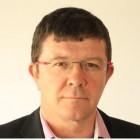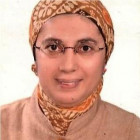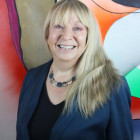Presentation Panel
Environmental Sustainability Through Learning Design
Date Friday, Nov 24 Time – Room: Charlottenburg I
In this Presentation Panel speakers will equip participants with design thinking skills for sustainability and explain how to develop a sustainable design framework for a micro-credential program focused on the UN Sustainable Development Goals. They will also present a new green learning agenda to address climate change through education.

John Scahill
Lecturer, Atlantic Technological University (ATU), Ireland
John Scahill is a lecturer and researcher in the Galway-Mayo School of Engineering at the Atlantic Technological University. John is a chartered engineer who specialises in low energy and low impact building technologies. He teaches on a range of undergraduate and post graduate programmes on the Circular Economy, BIM and Digital Leadership, Education for Sustainable Development (ESD) and the UN Sustainable Development Goals (UN SDGs).
His research interests are focussed on sustainability in higher education (SHE), the circular economy, innovative pedagogy, micro-credentials and the potential of the SDGs in delivering transformative ESD. John has a particular interest in the role of interdisciplinary collaboration in the enhancement of SHE and the promotion of ESD in higher education.
John is currently working as an academic developer on the development of a Sustainable Curriculum Framework as part of the “NTUTORR” project. He is the ATU project manager for the HCI funded Digital Academy for a Sustainable Built Environment (DASBE) project, and he is also leading a multi-disciplinary education/research project focussed on the UN SDGs.

Eman Swelam
Pesticide's Chemist and Toxicologist, Professor, Cairo University, Egypt
EMAN SWELAM, PH. D
PROFILE
Expert environmental toxicology and pesticides analysis university professor with more than 30 years of experience teaching at the college level. Distinguished record of publication in academic journals. Commitment to helping university students develop their full potential in their studies. Strong philosophy of teaching, and knowledge of many different methods to motivate students to develop their expertise in specific areas. Dedicated partner to university programs and outreach events that help promote learning and support the community.
EXPERIENCE
1-ENVIRONMENTAL TOXICOLOGIST, PROFESSOR. 2017-PRESENT
Eman’s research program includes two main areas: Bio pesticides and environmental toxicology. Her scientific publications include a book “environmental pollution with pesticides”, 19 articles and 2 online course “Introduction to Biological Sciences”, Egyptian E-learning University and “Pesticides pollution", Faculty of agricultural, Cairo Univ. Electronic production of 2 online university book Critical thinking, and Entrepreneurship.
She is Reviewer in OMICS Group Journals http://omicsonline.org,
Frontiers http://www.frontiersin.org and Science Alert http://scialert.net
She is as Quality manager of the Environmental Chemistry & Natural Resources Lab. (ISO/ IEC/17025 accredit), Faculty of Agriculture, Cairo University. 2009-present
2-DIRECTOR OF THE E-LEARNING CENTER IN CAIRO UNIVERSITY
2006-2021
She has worked for a long time on development and quality of the e-courses in the higher education and distance learning. She has been on the e-learning center at Cairo University since 2006 and served as director of the e-learning center in Cairo University for Twelve years, since 2009 She is the manager of the e-learning project “Improving the quality of using ICT in learning” in Cairo University.
3-ACTING VICE PRESIDENT OF THE EGYPTIAN E-LEARNING UNIVERSITY (EELU) FOR DEVELOPMENT AND INNOVATION. 2021-2022
EDUCATION
She received her B.S. in Entomology and Pesticides (Pesticide’s minor) from Cairo University (with honor). M.Sc. with specialization in movement of pesticides in Egyptian soils and Ph.D. with specialization in Bio pesticides from natural marine algae. She has received the Canada-Egypt-McGill Agricultural Response Program scholarship, McGill University, Canada during M.Sc., and German Academic Exchange Service (DAAD) scholarship, Bonn University, Germany for Ph.D.
KEY SKILLS AND CHARACTERISTICS
Leadership • Excellent coaching, teaching• Exemplary skills in reading, analysis, research, critical thinking, and writing, giving me the optimal tools to make further advances in the field. • Excellent Organizational skills • Strong oral communicator and lecturer in the classroom
CONTACT
@email
Eman. S. Swelam - Google Scholar
0100-5008365
Cairo Univ., Giza, 12613, Egypt
Moderator

Gilly Salmon
CEO, Education Alchemists. Ltd, United Kingdom
Professor Salmon is the founder and CEO of Education Alchemists Ltd - formed around her life's work including Carpe Diem learning design, pedagogical transformation, online education, technology-enhanced teaching, the 5 stage model, e-tivities, and Education 4.0. Until recently Professor of Learning Transformation and pro-vice-chancellor at universities in the UK and Australia, she is now based in London with all workshops offered fully digitally and worldwide. She is a well-known keynote speaker and workshop leader. Her books E-moderating and E-tivities are considered seminal texts
Links
Building Bridges to the Future: Sustainability and Scale, Gilly Salmon
This presentation will equip participants with design thinking skills in the education sector with a focus on sustainability.
Gilly Salmon will provide a foundation in key concepts for future sustainability and growth, enabling participants to navigate change and make a positive impact on the world.
Using a Sustainable Design Approach to Frame Education on the SDGs, John Scahill
This presentation will discuss the development of a sustainable design framework for a micro-credential program focused on the UN Sustainable Development Goals (SDGs).
John Scahill will explain how the program is delivered online, self-paced, and asynchronous, with a modular framework incorporating reusable learning objects. The project is currently in a pilot phase, and the presentation will cover the benefits of high-quality instructional design input, the role of sustainable design frameworks in education for sustainable development, and insights gained from the design and trial process.
Learning Goes Green: Quality Education for Climate Action, Eman Swelam
This presentation will propose a new green learning agenda to address climate change through education. It will outline three approaches to quality education for climate action: education for climate action and justice, education for green skills development, and education for reducing the environmental impact of education systems.
Eman Swelam will propose to incorporate green skills into all subjects and levels of education, align education programs with current and future labor market needs, and reduce the environmental impact of education systems.
The presentation will conclude with a call to action for policymakers, educators, learners, and stakeholders to prioritise “Learning Goes Green” as a strategic and moral imperative for the future of work and society.